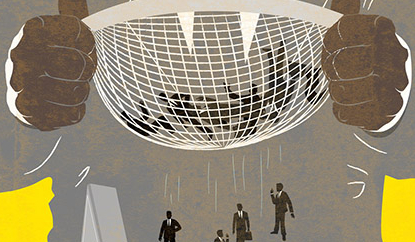Radical cleric linked to 9/11 plotter gets 7 years
|
Radical cleric linked to 9/11 plotter gets 7 years LONDON (AP) — A radical Muslim cleric linked to Sept. 11 plotter Zacarias Moussaoui was sentenced to seven years in prison Tuesday for inciting followers to kill non-Muslims when he led a London mosque. Abu Hamza al-Masri also faces terrorism charges in the United States, and a Justice Department spokesman said the U.S. "stands ready to resume extradition proceedings" when the British case is completed. In Tuesday's sentencing, Judge Anthony Hughes told al-Masri that his sermons at the Finsbury Park mosque, attended by Moussaoui and shoe-bomber Richard Reid, had endangered people around the world. "You helped to create an atmosphere in which to kill has become regarded by some as not only a legitimate course but as a moral and religious duty in pursuit of perceived justice," the judge said. Moussaoui pleaded guilty last year to plotting with al-Qaeda to fly planes into U.S. buildings and faces trial in the U.S. on terrorism conspiracy charges. Reid was convicted of attempting to blow up an American Airlines flight in 2001 with a shoe bomb. The one-eyed, hook-handed al-Masri sat impassively in the wood-paneled dock as the jury foreman read out guilty verdicts on 11 of 15 counts, including incitement to murder, fomenting racial hatred, possessing a terrorist document and possessing abusive recordings. He had faced a maximum of life in prison. Hughes sentenced al-Masri to seven years on the most serious charges of soliciting murder and allowed him to serve his sentences on the other charges concurrently. "I am quite satisfied that you are and were a person whose views created a real danger to the lives of innocent people in different parts of the world," he said. Defense attorneys said al-Masri planned to appeal. Defense lawyer Muddassar Arani said al-Masri believed he was "a prisoner of faith, and this is a slow martyrdom for him." A supporter in the public gallery shouted "God bless you Sheik Hamza" as the cleric was led from the courtroom. Others shouted to him in Arabic. Authorities in Britain and the United States accuse al-Masri of being at the center of a web of terrorist activity from the 1990s until police raided the Finsbury Park mosque in 2003. He has been charged in the United States on an 11-count indictment with trying to establish a terrorist training camp in Oregon, conspiring to take hostages in Yemen and facilitating terror training in Afghanistan. Under British law, the domestic charges took precedence over the extradition case, but al-Masri could now be sent to the United States for prosecution. In Washington, U.S. Justice Department spokesman Bryan Sierra said the United States "stands ready to resume the extradition proceedings against Abu Hamza when British law allows." In his trial at London's Central Criminal Court, al-Masri, whose real name is Mustafa Kamel Mustafa, faced charges of soliciting the murder of others, "namely a person or persons who did not believe in the Islamic faith." He was also charged with "using threatening or abusive language designed to stir racial hatred, possessing threatening or abusive recordings, and possessing a document likely to be useful in terrorism — the 'Encyclopedia of the Afghani Jihad.'" The cleric, who says he lost his eye and both hands in Afghanistan during the Soviet occupation, became a high-profile radical and a hate figure for British tabloids, who called him "Dr. Hook." After he was expelled from the mosque by administrators in 2003, he led Friday prayers in the street until his 2004 arrest on a U.S. extradition warrant. He has been detained in the high-security Belmarsh prison. During the trial, al-Masri, who has called the Sept. 11 attacks a Jewish plot and the invasion of Iraq a war on Islam, denied any involvement in violence, saying he was only a spokesman for political causes. But prosecutor David Perry told the jury that al-Masri "was a recruiting sergeant, a recruiting officer for terrorism and murder." Defense lawyer Edward Fitzgerald told jurors that although some of what the radical preacher said was offensive and "a bit over the top," he was not "intending to incite anybody to do anything specific." Attorney General Lord Goldsmith, the government's chief legal adviser, said that while free speech was important, "encouraging murder and inciting hatred against others because of their race will never be tolerated." But a Muslim leader said the verdict would trouble some in the Muslim community. "This is creating an environment that can only further alienate the Muslim community," said Massoud Shadjareh, chairman of the Islamic Human Rights Commission |








